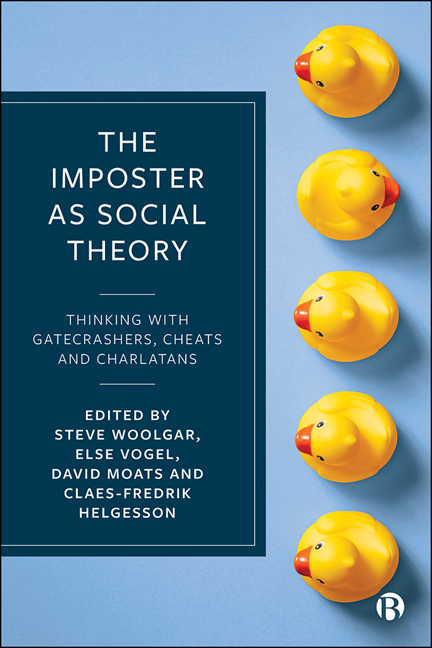Book contents
- Frontmatter
- Contents
- List of Figures and Boxes
- Notes on Contributors
- Preface
- 1 Thinking with Imposters: The Imposter as Analytic
- 2 The Desire to Believe and Belong: Wannabes and Their Audience in a North American Cultural Context
- 3 A Menagerie of Imposters and Truth-Tellers: Diederik Stapel and the Crisis in Psychology
- 4 Learning from Fakes: A Relational Approach
- 5 Imitations of Celebrity
- 6 Natural Imposters? A Cuckoo View of Social Relations
- 7 Conjuring Imposters: The Extraordinary Illusions of Mundanity
- 8 States of Imposture: Scroungerphobia and the Choreography of Suspicion
- 9 The Face of ‘the Other ’: Biometric Facial Recognition, Imposters and the Art of Outplaying Them
- 10 Faking Spirit Possession: Creating ‘Epistemic Murk ’ in Bahian Candomblé
- 11 The Guerrilla’s ID Card: Flatland against Fatland in Colombia
- 12 Good Enough Imposters: The Market for Instagram Followers in Indonesia and Beyond
- 13 Thinking beyond the Imposter: Gatecrashing Un/Welcoming Borders
- 14 Postscript: Thinking with Imposters – What Were They Thinking?
- Index
12 - Good Enough Imposters: The Market for Instagram Followers in Indonesia and Beyond
Published online by Cambridge University Press: 22 December 2021
- Frontmatter
- Contents
- List of Figures and Boxes
- Notes on Contributors
- Preface
- 1 Thinking with Imposters: The Imposter as Analytic
- 2 The Desire to Believe and Belong: Wannabes and Their Audience in a North American Cultural Context
- 3 A Menagerie of Imposters and Truth-Tellers: Diederik Stapel and the Crisis in Psychology
- 4 Learning from Fakes: A Relational Approach
- 5 Imitations of Celebrity
- 6 Natural Imposters? A Cuckoo View of Social Relations
- 7 Conjuring Imposters: The Extraordinary Illusions of Mundanity
- 8 States of Imposture: Scroungerphobia and the Choreography of Suspicion
- 9 The Face of ‘the Other ’: Biometric Facial Recognition, Imposters and the Art of Outplaying Them
- 10 Faking Spirit Possession: Creating ‘Epistemic Murk ’ in Bahian Candomblé
- 11 The Guerrilla’s ID Card: Flatland against Fatland in Colombia
- 12 Good Enough Imposters: The Market for Instagram Followers in Indonesia and Beyond
- 13 Thinking beyond the Imposter: Gatecrashing Un/Welcoming Borders
- 14 Postscript: Thinking with Imposters – What Were They Thinking?
- Index
Summary
Introduction
Instagram is a social media platform founded in 2010 and owned by Facebook (Leaver et al, 2020). It allows users to share ‘posts’ (photos and videos with accompanying text) which are then seen by their ‘followers’ (users that have chosen to be notified when a particular account posts new content). With more than one billion users, Instagram has become a major commercial force, not least as the main platform for the rise of ‘social media influencers’ (Khamis et al, 2017) – a term for popular users who are often paid by brands to feature their products in posts – and increasingly important for politicians (Lalancette and Raynauld, 2019). One influential journalist writes that the Instagram app ‘has become a celebrity-making machine the likes of which the world has never seen’ (Frier, 2020: xvii). In line with this, Instagram is at the heart of what has been called the ‘demotic turn’ across the global media landscape, as ‘ordinary’ people have become increasingly visible – initially through reality television shows such as Big Brother, and more recently through social media (Khamis et al, 2017). This has come to form the basis for what has been termed ‘microcelebrity’, a ‘mind-set and a collection of self-presentation practices endemic in social media, in which users strategically formulate a profile, reach out to followers, and reveal personal information to increase attention and thus improve their online status’ (Marwick, 2015: 138; see also Senft, 2008: 25).
Instagram has shaped a more specific form of microcelebrity, which Marwick calls ‘Instafame’, precisely defined as ‘the condition of having a relatively great number of followers on the app’ (2015: 137). Through Instagram and related social media platforms, such metrics – which are publicly listed – have become critical to contemporary forms of celebrity and the broader attention economy in which what is valued is the ability to gather and maintain an interested audience (Fairchild, 2007). Indeed, these metrics, along with the monetary rewards and perks associated with them, ‘encourage people to actively foster an audience’ (Marwick, 2015: 140, see also Gerlitz and Helmond, 2013). The generalized ability to engage with a public has thus dramatically expanded to include not only traditional celebrities (film stars and athletes), but also the broader field of microcelebrities (who may only be famous for being on Instagram).
- Type
- Chapter
- Information
- The Imposter as Social TheoryThinking with Gatecrashers, Cheats and Charlatans, pp. 269 - 292Publisher: Bristol University PressPrint publication year: 2021



